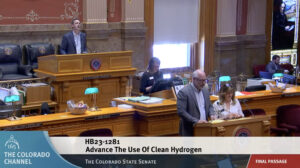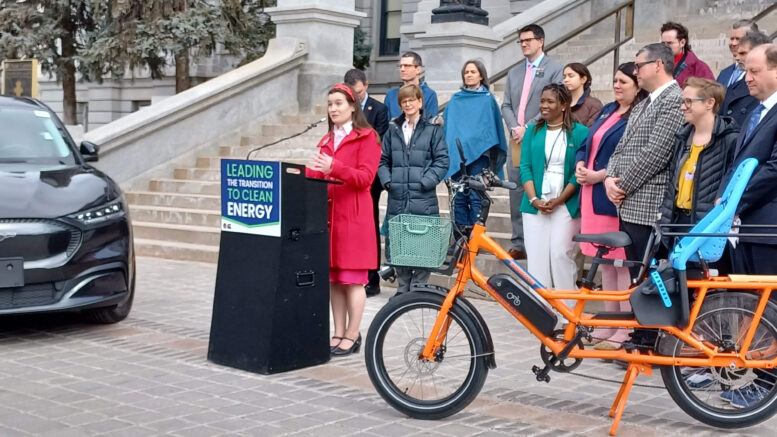Colorado legislators passed a swath of bills at the end of the 2023 legislative session to set up regulatory frameworks for emerging energy sectors, but sector leaders say they remain laden with so many guardrails that Colorado won’t reap their economic or environmental benefits.
Those bills were representative of a session in which energy sector leaders spent large amounts of time arguing to take highly technical subjects out of the hands of legislators and allow them to be discussed and made into rules by professionals with intricate knowledge of their fields. Those efforts led to major makeovers of bills dealing with subjects ranging from air-quality permitting to use of water in fracking, but they won’t help to bring about the innovation needed to help increase efficiency while reducing the carbon footprint of energy production, they said.
A quartet of bills, detailed at length in an earlier article from The Sum & Substance, seek to enable the state to provide stable regulatory guidance to operators in emerging energy fields and to offer some financial incentives to spur investment in those technologies. Sen. Chris Hansen, a Denver Democrat who sponsored three of the four bills, said in an interview that Colorado needs these breakthroughs to decarbonize sectors like buildings and industrial areas with harder-to-reduce footprints and that the state can create thousands of jobs this way.
What the bills on emerging energy sectors do
The four key bills, all of which are on their way to Gov. Jared Polis’ desk, are:
- Senate Bill 16, whose wide-ranging array of provisions includes allowing the state to seek from the U.S. Environmental Protection Agency the ability to regulate Class VI injection wells into which carbon is pumped back into the ground, where it can be sequestered;
- House Bill 1210, which would create a carbon-management roadmap to determine the economic and environmental potential of carbon capture and utilization and would make many carbon-management projects eligible for grants;
- SB 285, which transforms the Colorado Oil and Gas Conservation Commission into the Colorado Energy and Carbon Management Commission and authorizes it to regulate deep geothermal resources and intrastate underground natural gas storage; and,
- HB 1281, which sets in place regulations for the production of clean hydrogen made from water and offers state funding that can be matched with larger federal grants to spur that nascent sector as Colorado tries to win a grant to be a part of a regional hydrogen hub.

Colorado state Sens. Kevin Priola and Lisa Cutter explain their bill on regulating and promoting clean hydrogen to the Colorado Senate earlier this month.
Significant guardrails
However, the bills include so many safeguards — most requested by environmental organizations — that they threaten to scare off potential investment, critics said.
HB 1210, for example, bans financial incentives for enhanced oil recovery projects in which carbon is captured from a pollutant source and then pumped into the ground to help extricate oil — a process that both buries carbon underground and produces less carbon-intensive oil. SB 285 does not discus allowing for carbon-capture regulation, and SB 16 allows local governments to deny Class VI injection wells or to tack on fees that could allow them to buy emergency response vehicles for well leaks that a sponsor described as “very unlikely.”
Meanwhile, the sponsors of HB 1281 added an amendment requiring that any companies seeking grants use hourly matching, a method of creating green hydrogen that requires production to occur only when the companies use wind or solar energy to operate electrolyzers. Some studies have shown that could increase production costs as much as 185% and negate any benefit that the companies might receive even from getting the higher federal tax credits, officials at electricity supplier Next Era Energy Resources said.
Despite these pleas, legislators did not add any significant amendments to the bills in the closing week of the session. Sen. Lisa Cutter, the Morrison Democrat co-sponsoring HB 1281, told the Senate Finance Committee on May 4 that the bill was meant to support only the cleanest forms of hydrogen use and asked them not to water that down.
At least one condition coming
“Everyone has worked to make sure the economic benefits are intact,” Cutter said. “Any amendments that threaten these guardrails, especially hourly matching, will threaten the adoption of this legislation.”
Polis is concerned enough about the hourly-matching requirement, however, that he’s promised to include a signing letter when he inks HB 1281, an industry source said. That letter will urge the Public Utilities Commission, which will regulate hydrogen, to review the hourly-matching mandate and make recommendations to the Legislature on its economic viability.
As for the rest of the bills, though, they are setting up regulatory frameworks that are more likely to repel energy producers than they are to invite them to invest in these technologies, except for geothermal energy, around which the state has set fewer guardrails, observers said. That is particularly worrisome because Colorado will be competing for investment against states like Wyoming and North Dakota that have less stringent, energy officials said.
Competition for emerging energy sectors

Kalt Schwartz is director of American Petroleum Institute Colorado.
The process for the soon-to-be-renamed COGCC to approve new projects in areas like underground natural gas storage derisively has been called “NEPA-plus,” referring to the lengthy and cumbersome National Environmental Policy Act hearings some proposals must undergo. Added onto the setback requirements that SB 16 establishes for Class VI injection wells and the multiple definitions of “cumulative impacts” that the bills put forward, the bills seem to discourage oil-and-gas producers with the infrastructure to mine these new sources of energy from doing so, said Kait Schwartz, American Petroleum Institute Colorado director.
“Our goal this session was to create a framework so that it was feasible to operate in Colorado,” Schwartz said. “This will all drive off infrastructure investments.”
Polis has until June 7 to sign bills that passed during the legislative session that ended Monday, veto them or allow them to become law without his signature.
